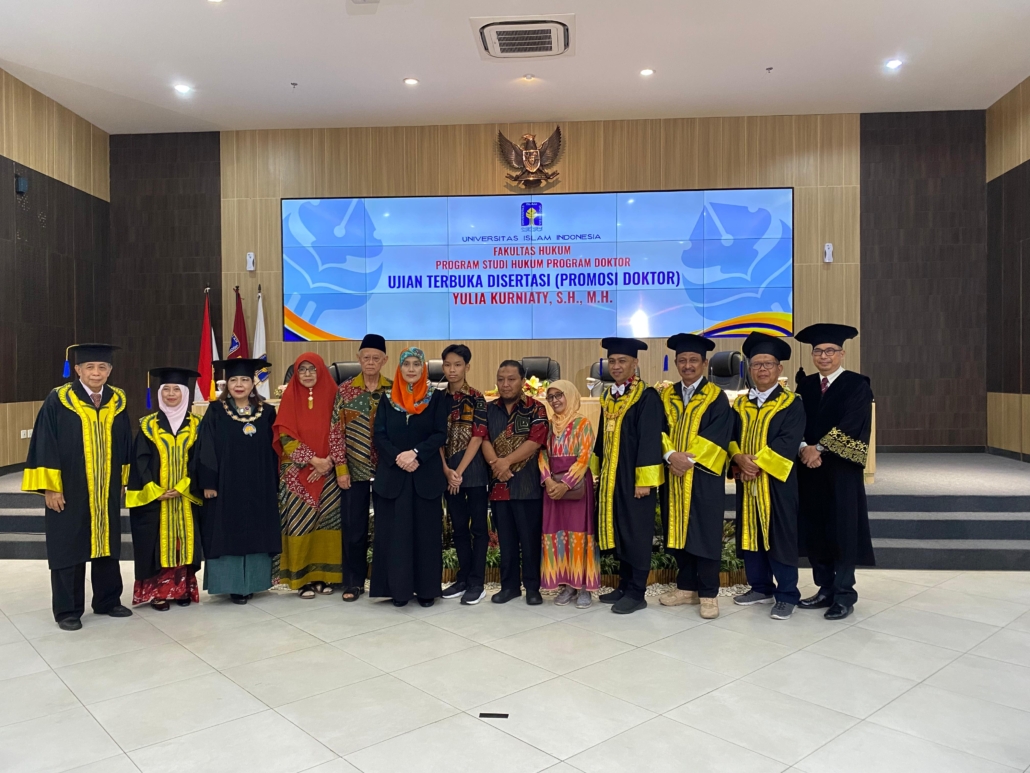Public Defense of Doctoral Dissertation – Yulia Kurniaty, S.H., M.H.

Kaliurang; Thursday, June 26, 2025, at 13.00 WIB, the public defense of the doctoral dissertation by Yulia Kurniaty, S.H., M.H. was held as part of the Doctoral Study Program in Law (PSHPD), Faculty of Law, Universitas Islam Indonesia. The defense took place in the 4th Floor Auditorium of the Faculty of Law, UII, chaired by Prof. Dr. Budi Agus Riswandi, S.H., M.Hum., with Prof. Dr. Rusli Muhammad, S.H., M.H. serving as the Promoter, and Dr. Aroma Elmina Martha, S.H., M.H. as the Co-Promoter. The examination committee also included Prof. Dr. Dra. Mg. Endang Sumiarni, S.H., M.Hum., Dr. Trisno Raharjo, S.H., M.Hum., Prof. Dr. M. Syamsudin, S.H., M.H., and Dr. M. Arif Setiawan, S.H., M.H.
At the beginning of the session, the promovenda delivered a 10-minute presentation of her dissertation entitled “An Ideal Model for Handling and Sanctioning Sexual Violence in Higher Education Institutions Based on Justice.” She explained that her research aims to analyze the current implementation of sexual violence handling in universities, especially considering that the enactment of Ministerial Regulation No. 30 of 2021 on the Prevention and Handling of Sexual Violence in Higher Education has not significantly reduced incidents. This situation led to the issuance of Ministerial Regulation No. 55 of 2024, which further regulates violence prevention and response in higher education institutions.
In her dissertation, the promovenda addressed three main research questions:
-
How is sexual violence currently handled in higher education institutions?
-
What are the similarities, differences, and challenges in the handling process?
-
What is the ideal model for handling and sanctioning sexual violence in higher education?
The findings of her research are as follows:
-
First, the handling of sexual violence by task forces across the sampled universities varies greatly, depending on the experience, analytical abilities, and available resources of task force members, as well as the financial and institutional support.
-
Second, commonalities in handling include adherence to procedures outlined in the ministerial regulations and the use of social media as a reporting channel. Differences lie in operational techniques—for example, some task forces divide into investigation teams while others do not. There is also inconsistency in the presence of supporting units like health clinics, counseling centers, or legal aid services. Challenges include limited time due to the members’ primary duties as lecturers, students, and staff, as well as inadequate funding and facilities.
-
Third, the ideal model proposed is the Balanced Interest Integration Model, which prioritizes the interests of the reported party, the victim, the university, and the wider campus community. The ideal sanctioning model is based on five aspects: the nature of the violation, its impact, the victim’s losses, the perpetrator’s gain, and any aggravating or mitigating circumstances. These components form the basis for case analysis and sanction recommendations, ensuring that sanctions serve to restore victims, deter perpetrators, and prevent recurrence within the university.
During the defense, the promovenda responded convincingly to the examiners’ questions and successfully defended the arguments within her dissertation. As a result, Dr. Yulia Kurniaty, S.H., M.H. is now officially recognized as the 187th Doctor of Law through the structured learning system of the Doctoral Program in Law at the Faculty of Law, Universitas Islam Indonesia.
At the closing of the session, the Co-Promoter, Dr. Aroma Elmina Martha, S.H., M.H., extended her congratulations and expressed hopes that the knowledge gained would be beneficial for the nation and religion and bring blessings to others.






